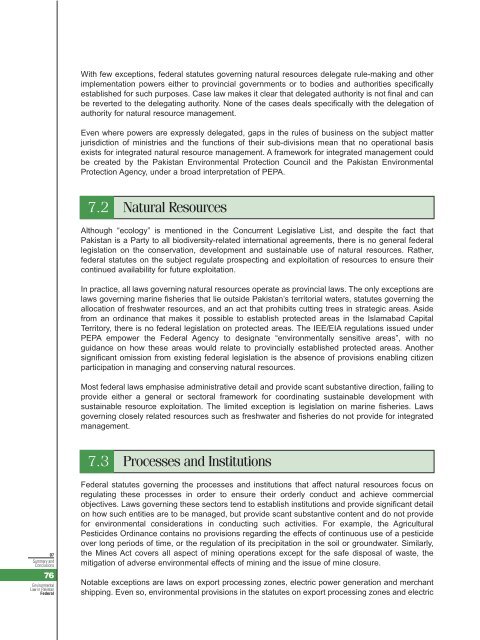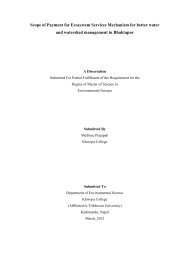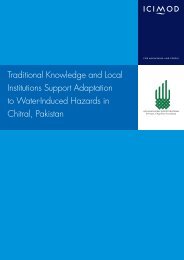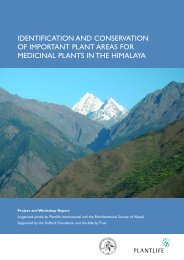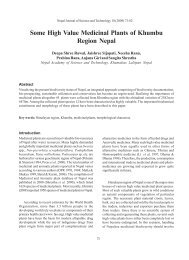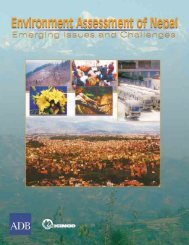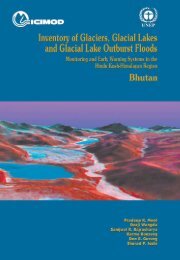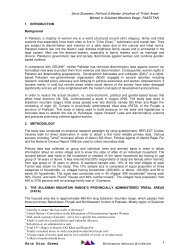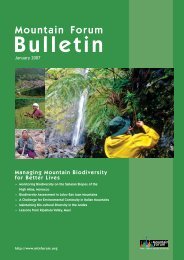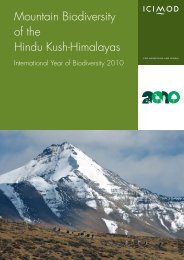With few exceptions, federal statutes govern<strong>in</strong>g natural resources delegate rule-mak<strong>in</strong>g and otherimplementation powers either to prov<strong>in</strong>cial governments or to bodies and authorities specificallyestablished for such purposes. Case law makes it clear that delegated authority is not f<strong>in</strong>al and canbe reverted to the delegat<strong>in</strong>g authority. None of the cases deals specifically with the delegation ofauthority for natural resource management.Even where powers are expressly delegated, gaps <strong>in</strong> the rules of bus<strong>in</strong>ess on the subject matterjurisdiction of m<strong>in</strong>istries and the functions of their sub-divisions mean that no operational basisexists for <strong>in</strong>tegrated natural resource management. A framework for <strong>in</strong>tegrated management couldbe created by the <strong>Pakistan</strong> <strong>Environmental</strong> Protection Council and the <strong>Pakistan</strong> <strong>Environmental</strong>Protection Agency, under a broad <strong>in</strong>terpretation of PEPA.7.2 Natural ResourcesAlthough “ecology” is mentioned <strong>in</strong> the Concurrent Legislative List, and despite the fact that<strong>Pakistan</strong> is a Party to all biodiversity-related <strong>in</strong>ternational agreements, there is no general federallegislation on the conservation, development and susta<strong>in</strong>able use of natural resources. Rather,federal statutes on the subject regulate prospect<strong>in</strong>g and exploitation of resources to ensure theircont<strong>in</strong>ued availability for future exploitation.In practice, all laws govern<strong>in</strong>g natural resources operate as prov<strong>in</strong>cial laws. The only exceptions arelaws govern<strong>in</strong>g mar<strong>in</strong>e fisheries that lie outside <strong>Pakistan</strong>’s territorial waters, statutes govern<strong>in</strong>g theallocation of freshwater resources, and an act that prohibits cutt<strong>in</strong>g trees <strong>in</strong> strategic areas. Asidefrom an ord<strong>in</strong>ance that makes it possible to establish protected areas <strong>in</strong> the Islamabad CapitalTerritory, there is no federal legislation on protected areas. The IEE/EIA regulations issued underPEPA empower the Federal Agency to designate “environmentally sensitive areas”, with noguidance on how these areas would relate to prov<strong>in</strong>cially established protected areas. Anothersignificant omission from exist<strong>in</strong>g federal legislation is the absence of provisions enabl<strong>in</strong>g citizenparticipation <strong>in</strong> manag<strong>in</strong>g and conserv<strong>in</strong>g natural resources.Most federal laws emphasise adm<strong>in</strong>istrative detail and provide scant substantive direction, fail<strong>in</strong>g toprovide either a general or sectoral framework for coord<strong>in</strong>at<strong>in</strong>g susta<strong>in</strong>able development withsusta<strong>in</strong>able resource exploitation. The limited exception is legislation on mar<strong>in</strong>e fisheries. <strong>Law</strong>sgovern<strong>in</strong>g closely related resources such as freshwater and fisheries do not provide for <strong>in</strong>tegratedmanagement.7.3 Processes and Institutions07Summary andConclusions76<strong>Environmental</strong><strong>Law</strong> <strong>in</strong> <strong>Pakistan</strong>FederalFederal statutes govern<strong>in</strong>g the processes and <strong>in</strong>stitutions that affect natural resources focus onregulat<strong>in</strong>g these processes <strong>in</strong> order to ensure their orderly conduct and achieve commercialobjectives. <strong>Law</strong>s govern<strong>in</strong>g these sectors tend to establish <strong>in</strong>stitutions and provide significant detailon how such entities are to be managed, but provide scant substantive content and do not providefor environmental considerations <strong>in</strong> conduct<strong>in</strong>g such activities. For example, the AgriculturalPesticides Ord<strong>in</strong>ance conta<strong>in</strong>s no provisions regard<strong>in</strong>g the effects of cont<strong>in</strong>uous use of a pesticideover long periods of time, or the regulation of its precipitation <strong>in</strong> the soil or groundwater. Similarly,the M<strong>in</strong>es Act covers all aspect of m<strong>in</strong><strong>in</strong>g operations except for the safe disposal of waste, themitigation of adverse environmental effects of m<strong>in</strong><strong>in</strong>g and the issue of m<strong>in</strong>e closure.Notable exceptions are laws on export process<strong>in</strong>g zones, electric power generation and merchantshipp<strong>in</strong>g. Even so, environmental provisions <strong>in</strong> the statutes on export process<strong>in</strong>g zones and electric
power generation are vague and general, fail<strong>in</strong>g to provide clear guidel<strong>in</strong>es or limitations. The mostrecent legal <strong>in</strong>strument regulat<strong>in</strong>g nuclear <strong>in</strong>stallations does not acknowledge similar authority givento the Federal Agency under PEPA to license, monitor and <strong>in</strong>spect <strong>in</strong>stallations and activities<strong>in</strong>volv<strong>in</strong>g radioactive substances, nor does it provide for coord<strong>in</strong>ation of these functions. Meanwhile,environmental provisions <strong>in</strong> the law on export process<strong>in</strong>g zones are discretionary rather thanmandatory. The Merchant Shipp<strong>in</strong>g Ord<strong>in</strong>ance is more specific, referr<strong>in</strong>g to the provisions of an<strong>in</strong>ternational agreement, while an amendment to the Karachi Port Trust Act obliges users of the portto ensure a pollution-free environment and makes them liable for clean-up costs.But even laws that are seem<strong>in</strong>gly unrelated to natural resources could be used to encouragesusta<strong>in</strong>able development and susta<strong>in</strong>able use. Creative <strong>in</strong>terpretation of the def<strong>in</strong>ition of “publicpurposes” provided <strong>in</strong> the Land Acquisition Act, for <strong>in</strong>stance, could allow the government to acquireland for conservation. In addition to the fees and charges provided for <strong>in</strong> PEPA, excise revenuescould be levied specifically to fund natural resource conservation, restoration and rehabilitation. Thetariff structure of central taxes and duties could be creatively deployed to encourage environmentfriendlycommercial activities, and discourage the import of goods that are likely to causeenvironmental damage. In the same way, laws regulat<strong>in</strong>g agricultural, veter<strong>in</strong>ary and domesticchemicals and drugs could require classification and labell<strong>in</strong>g systems to advise regulators andusers alike on the proper control and use of these substances <strong>in</strong> order to avoid harm to theenvironment generally and to natural resources <strong>in</strong> particular. Federal research <strong>in</strong>stitutions could begiven <strong>in</strong>centives to develop systems for the comprehensive monitor<strong>in</strong>g of environmental load<strong>in</strong>gsand socio-economic activities that impact natural resources. Such <strong>in</strong>stitutions could also beprovided <strong>in</strong>centives to undertake activities aimed at promot<strong>in</strong>g an understand<strong>in</strong>g of the mechanismsof environmental change and predict<strong>in</strong>g their impacts.Although it does not govern natural resources directly, PEPA affects them <strong>in</strong>directly by provid<strong>in</strong>g aframework for controll<strong>in</strong>g and mitigat<strong>in</strong>g pollution. In requir<strong>in</strong>g environmental clearances forspecified types of new projects and activities, PEPA can <strong>in</strong>troduce environmental protection andnatural resource conservation <strong>in</strong>to sectors where exist<strong>in</strong>g laws do not otherwise provide for it.Effective implementation of PEPA’s pollution control provisions and compliance with NEQS wouldcontribute significantly to improv<strong>in</strong>g the quality of natural resources.PEPA’s support for natural resource conservation and management rema<strong>in</strong>s limited, however, fora number of reasons. Its provisions do not override those of other statutes and, despite PEPA’sscope, it is difficult to implement the provisions of the law through departments and agencies otherthan the Federal Agency <strong>in</strong> the absence of clear obligations for do<strong>in</strong>g so. The EIA regime is limitedto new projects. Exist<strong>in</strong>g activities, therefore, are not subject to its requirements and it does notdeal with the cumulative effects of projects over time. The law does not make it mandatory forpollution charges levied on <strong>in</strong>dustry to be used to mitigate environmental damage or restoredegraded resources. The provisions of PEPA are primarily reactive, although an environmentalprotection order (Section 16) may be used proactively. The law does not provide a framework for<strong>in</strong>tegrat<strong>in</strong>g its provisions with natural resource legislation, for example to ensure pollution-freewater for fisheries.7.4 Governance and Natural Resource ManagementFor all its benefits, the distribution of powers between the federal government and the prov<strong>in</strong>cescomplicates the process of manag<strong>in</strong>g natural resources and regulat<strong>in</strong>g the processes that affectthem. For <strong>in</strong>stance, the m<strong>in</strong><strong>in</strong>g of nuclear substances and petroleum products lies with<strong>in</strong> theexclusive doma<strong>in</strong> of the federal government, while the management of natural resources andprotected areas affected by such m<strong>in</strong><strong>in</strong>g is most likely to be under the control of a prov<strong>in</strong>cialgovernment. In the event of a conflict, federal law will prevail. Local government bodies have been07Summary andConclusions77<strong>Environmental</strong><strong>Law</strong> <strong>in</strong> <strong>Pakistan</strong>Federal


